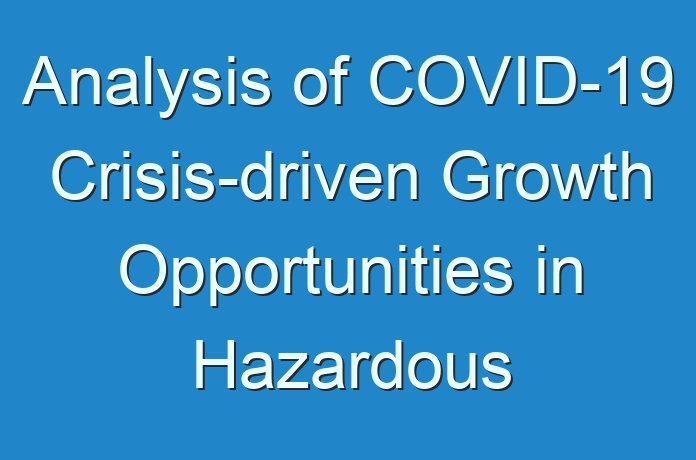
Hazardous Waste Management Market: Key Highlights
- The global hazardous waste management market was valued at ~US$ 12.1 Bn in 2018 and is anticipated to expand at a CAGR of ~5% during the forecast period.
- Among the physical states, the solid segment accounted for a major share of the global hazardous waste management market in 2018.
- Among the wastes, the chemical segment held a significant share of the global hazardous waste management market in 2018. Investments in the global chemical industry have been increasing over the last few years. According to the International Council of Chemical Associations (ICCA), the chemical industry’s contribution to global GDP was valued at US$ 5.7 Trn in 2017.
- Among the chemical compositions, the inorganic waste segment held a dominant share of the global hazardous waste management market in 2018.
- Among the treatments, the thermal segment held a major share of the global hazardous waste management market in 2018.
- Among the disposal methods, the deep well injection segment held a leading share of the global hazardous waste management market in 2018.
- North America is estimated to offer high growth potential to the hazardous waste management market in the next few years, owing to rapid growth of pharmaceutical, chemical, and oil & gas industries in the region.
Key Drivers of Global Hazardous Waste Management Market
- Increase in R&D activities, rise in the number of patients suffering from chronic diseases, and rapid growth of healthcare and pharmaceutical industries worldwide are factors likely to fuel the demand for the collection of medical wastes from large as well as small medical waste generators across the globe in the near future. Statistics from a study conducted by the University of Leeds in 2015 indicate that, the U.S. produces an average of 8.4 kilogram/bed/day of medical wastes. This is the maximum rate of hospital medical waste generation across the world. These factors are expected to propel the global hazardous waste management market during the forecast period.
REQUEST FOR COVID19 IMPACT ANALYSIS –
https://www.transparencymarketresearch.com/sample/sample.php?flag=covid19&rep_id=39605
- Furthermore, several government organizations such as the Food and Drug Administration (FDA), Environment Protection Agency (EPA), and Drug Enforcement Administration (DEA) are consistently working toward the proper management of waste in order to ensure safety from hazardous medical, chemical, and radioactive wastes. Several non-government organizations (NGOs) and community-based organizations (CBOs) are stepping in to help hospitals and other healthcare facilities in the collection, recycle, and disposal of medical waste. For instance, Intervol, a U.S.-based NGO, is actively engaged in the collection of unused medical supplies. It encourages healthcare facilities to recycle unused medical supplies and reduce the cost incurred for their disposal. Such initiatives by governments and NGOs to manage hazardous waste are fueling the global market for hazardous waste management.
- High capital investments is a prominent factor hampering the entry of companies into the global hazardous waste management market.
Request A Sample of Hazardous Waste Management Market –
https://www.transparencymarketresearch.com/sample/sample.php?flag=S&rep_id=39605
Asia Pacific is a Highly Lucrative Market for Hazardous Waste Management
- North America dominates the global hazardous waste management market, due to the increasing generation of hazardous waste from chemical, pharmaceutical, oil & gas, and nuclear industries in the region. According to the World Nuclear Association, the number of operable reactors in the U.S. was 99 at the end of 2017.
Buy Now :
https://www.transparencymarketresearch.com/checkout.php?rep_id=39605<ype=S
- The hazardous waste management market in Asia Pacific is expected to expand at the maximum CAGR during the forecast period. Asia Pacific is the leading generator of wastes across the globe. Increase in the prevalence of diseases, growth of chemical and nuclear industries, and initiatives taken by governments regarding the management of hazardous waste are expected to boost the hazardous waste management market in Asia Pacific during the forecast period.
- According to the China Hospital Industry Report, the total number of hospitals in China was 33,000 at the end of February 2019. In the first two months of 2019, there were 550 million patient visits to hospitals in China. Thus, medical waste generation in the country is high.
More Trending Reports by Transparency Market Research –
Global Hazardous Waste Management Market: Key Developments
- In September 2018, SUEZ NWS and Shanghai Huayi Company entered into an agreement to jointly provide hazardous waste treatment and recovery services in Qinzhou, Guangxi Province, China. The company is handling the responsibility of the management of hazardous waste at several industrial sites in China, including the Shanghai Chemical Industry Park.
- In May 2018, Sembcorp Industries sold its medical waste treatment division to TEE Medical Services for US$ 20 Mn. The division specialized in the treatment and disposal of biohazardous and pharmaceutical wastes. TEE Medical Services is a 50:50 joint venture between TEE Infrastructure and Asia Enviro Services.
- In December 2016, CLEAN HARBORS, INC. unveiled a new incinerator at its facility in El Dorado, the U.S. This incinerator is technologically considered the most advanced incinerator in North America. Its use has increased the company’s hazardous waste management capacity.
Hazardous Waste Management Market: Competition Landscape
- The global hazardous waste management market is highly fragmented with the presence of a large number of players.
- High capital investments in facilities, equipment, technologies, and transport vehicles poses a high barrier to the entry of new players in the global hazardous waste management market. Regulatory pathways for the clearance and approval of landfills, incinerators, and other methods of waste management are time-consuming and capital-intensive. This creates another barrier for the entry of new players in the market.
- Key players operating in the global hazardous waste management market are Veolia, Suez, Waste Management, Inc., Bechtel Corporation, SMS Envocare Ltd, Waste Connections Inc., CLEAN HARBORS, INC., Stericycle Inc., Republic Services, Inc., Morgan Group, Recology Inc., Envion India, Chloros Environmental Ltd, and American Waste Management Services, Inc.





